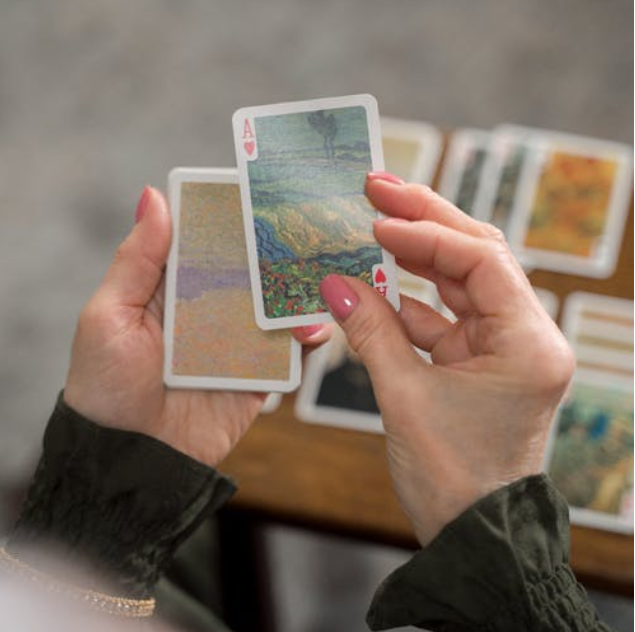Solitaire is probably the most popular game that’s played with only a deck of 52 playing cards. There are two ways to get started when you sit at your table to play this timeless game — either keep it simple or become more complicated. Learning how to play solitaire is fairly simple and there are a few rules that you need to follow in order to play the game correctly.
The most popular solitaire strategy
Once card is dealt face up and placed face down horizontally are six more cards. With your second card, deal one card face up, and five more cards set face down. Keep dealing until all the cards have been distributed. You can also use suit symbols instead of numbers. For example, hearts would be A-K Q J 10 9 8 7 6 5 4 3 2 1 if there were four suits (spades, clubs, diamonds, and hearts). Or you could just designate each suit as its own group. If you want to make things even easier, consider using an online tool like Cards Against Humanity so you don’t need to hold onto any cards once they’ve been dealt out.
Once you’re done distributing all the cards, turn over every other card except the first one. This will form what’s called a foundation. Once you do this, go through each column from left to right, starting with the next card after the foundation, and remove them from the board. Don’t worry about forming groups at this point, because we’ll come back to doing that later. Continue this process throughout the entire board, and you should end up with no cards remaining. Congratulations! Now you know how to play solitaire.
There are a few more pro-tips & methods that we’re going to discuss to help you understand how to play solitaire. It may take a while before you start winning games at solitaire, but once you learn the basics, you’ll find yourself better able to win without getting bored halfway through.
The goal here isn’t necessarily to win every game. In fact, you might not care too much about winning if you’re simply trying to pass time during long waits or commuting to work. However, if you enjoy the challenge of building up a stack of cards, then learning how to play solitaire becomes addictive.

Can solitaire be played with two players?
Yes. Often referred to as “double solitaire”. When playing against someone else, it’s best to try to avoid letting them see which of their cards are still visible. Some players aren’t very good at memorizing where individual cards lie on the board, making it easier for them to predict upcoming moves based solely on their current hand. That said, sometimes it’s unavoidable since you both have access to the same pile. So, remember: Always leave something hidden, whether it’s another ace, king, queen, jack, ten, nine, eight, seven, six, or five. The idea is to throw off anyone who thinks they know exactly where everything lays on the board.
If you happen upon a situation where you run into a deadlock, such as having three kings and nothing else, you could always “go fishing” by removing the topmost card from the pile, hoping it has enough value to break the tie. Just be careful not to accidentally reveal anything important to whoever holds those cards.
Another strategy involves breaking up large stacks. Instead of keeping things together, separate them into smaller stacks. Then when you shuffle, you create new piles rather than just shuffling the whole thing again. By doing this, you force people to constantly move pieces around, which makes it harder for them to anticipate what’s coming. Plus, you won’t feel bad if you lose because you had difficulty figuring out where certain cards lay.
How often can the deck be reshuffled?
There’s no official rule regarding how many times per round you can reshuffle. Generally speaking, though, it shouldn’t exceed three times per round. But again, there are exceptions. Sometimes a player wants to save their final discard to increase their odds of drawing a high-ranking card, so they’d reshuffle multiple times. Other times, a person might want to wait until it gets really close to reshuffled to draw a particular card, because they think the opponent will be distracted otherwise.
You must maintain strict confidentiality when playing double solitaire or any other card game for that matter. Never tell others what cards you have or what cards you wish to draw. Even if you think you’re being discreet, your opponents may overhear you talking about your hand and figure out what cards you actually drew. Also never share information about specific hands that you haven’t yet seen. Someone could easily replicate whatever tactic you used against them. And if you ever cheat, you risk ruining your reputation forever. Especially if you cheat during a friendly card game. Friends don’t cheat other friends.
Before beginning a game, decide beforehand how often you plan on holding meetings between rounds. Ideally, choose a number equal to the number of players. For instance, if there are six people, meet every sixth turn. Having designated meeting points makes it easy for everyone to keep track of what happens. You could also assign colors to players and write down turns so that everyone knows who goes next. As far as actual timing goes, however, there’s no hard-and-fast rule. If a player finishes early, they could elect to continue immediately. They might even skip ahead by several rounds depending on how quickly they complete their tasks.
Playing solitaire requires patience and planning, especially considering the speed in which games progress. It’s usually best to begin slow and build momentum slowly. Try not to rush unless absolutely necessary. After all, if you’re rushing, you may miss opportunities to improve your position. Think strategically, and try to weigh your options carefully. When going along smoothly, you may notice yourself thinking too little and acting impulsively. Remember that success comes from proper preparation and foresight.
Conclusion – Decks specifically made for beginners
To help newcomers familiarize themselves with the rules of solitaire, consider creating decks specifically designed for beginners. These sets typically contain fewer wild cards, higher ranks, and simpler layouts. Alternatively, you could mix cards from different packs to create a custom deck. Either option allows players to practice efficiently and gain confidence before moving on to tougher versions of solitaire.
If this information has helped you & you’re interested in learning how to study better, click here to read more!

Leave a Reply